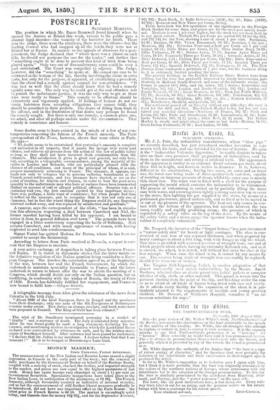Some doubts seem to have existed in the minds of
a few of our con- temporaries respecting the fulness of the French amnesty. The Paris correspondent of the Times, however, shows that none exists at Paris. He says-
" No doubt seems to be entertained that yesterday's amnesty is complete and unlimited in all respects, that it passes the sponge over every past offence, and relieves all persons from the action of the law of public safety so long as they shall not have incurred fresh condemnation from the tribunals. The satisfaction it gives is great and general, not only here, but, according to a telegraphic correspondence, among the majority, of the exiles in London and Brussels, who are particularly pleased with the absence of all conditions, and many of the principal of whom, it is said, propose immediately returning to France. 'The measure, it appears, ex- tends not only to refugees but to persons suffering banishment in the French penal settlements, and two steamers have started, or are on the point of startine for Algeria and Guiana, in order to bear the good news speedily to the 'Unfortunate men who have at various times been transported thither on account of seal or alleged political offences. Surprise was, as I yesterday told you, the first emotion excited by this important decree ; there was, perhaps, a little want of confidence ; but when people had time to reflect on the measure, and to recognize that it was not only one of clemency, but in fact the wisest thing the Emperor could do, any lingering mistrust melted away, and was replaced by satisfaction and gratitude."
A rumour, says the correspondent of the Globe, "has been in circula- tion this afternoon respecting a duel between Cattrobert and Niel, the former marshal having been killed by hie opponent. I am bound to notice it from its general diffusion over town." The generals have been engaged in a bitter controversy respecting the battle of Solferino. Neil accuses Canrobert, and with much appearance of reason, with having neglected to send him reinforcements.
Signor Farini has quitted Modena for Parma, where he has been re- quested to accept the dictatorship.
According to letters from Paris received at Brussels, a report is cur- rent that the Empress is enceinte.
A very active exchange of despatches is taking place between France and Russia. It is stated in diplomatic circles that the latter insists on the definitive regulation of the Italian question being confided to a Euro- pean Congress. She invokes the convention agreed to, at the beginning of the war, between her and the French Government, by which she undertook to maintain neutrality favourable to France, and the latter undertook in return to labour after the war to obtain the meeting of a Congress, which should decide not only on the Italian question, but on modifying, in conformity with the wishes of Russia, the treaty of Paris of 1856. Russia has faithfully fulfilled her engagement, and France is now bound to fulfil hers —Cologne Gazette.
A telegraphic message from Aden gives the substance of the news from Calcutta to the 16th July. "About 5000 of the local European force in Bengal and the provinces have their discharge ; only one man of the 5th Europeans at Berhampore remains under arrest. New duties on stamps, receipts, and bank notes have been proposed in Council. The King of Oude has been released."


























 Previous page
Previous page